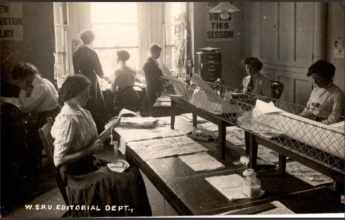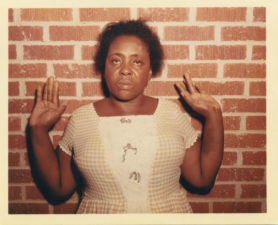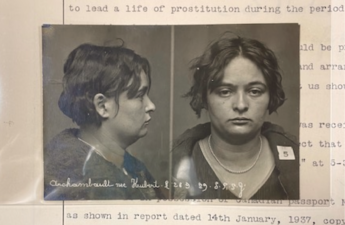The UN hosts the Commission on the Status of Women annually in New York City. CSW 58 – 9-20 March 2014 – saw a debate on human rights and development. Clearly human rights should not be seen as in conflict with development, and development should go ahead in complete concert with human rights. Women from CSW 58 spoke out on this issue, drafting the Civil Society Red Flag appearing here. All organisations endorsing the letter to date and involved in shaping it are listed.
In the past year, civil society organizations worldwide from different fields of work have closely followed United Nations Member States’ deliberations on the post 2015 development agenda. We have welcomed invitations to contribute through online or in-person consultations and have been suggesting development alternatives, analysis, and comprehensive recommendations throughout this process.
Despite these efforts, we are alarmed that within the post 2015 discussions, little seems to be underway to reverse the trend of doing business as usual and that the UN is about to lose the opportunity to transform the current vicious cycle of development focused on economic growth alone that fuels inequalities, inequities, environmental degradation and marginalization into a virtuous cycle where human rights and justice prevail. Despite the statement of the UN Secretary General that “no one will be left behind,” the Sustainable Development Goals [SDGs] are not on track to be built on the essential priorities for a sound and effective post 2015 global agenda, namely human rights and dignity for all.
In the Millennium Declaration, governments made an explicit commitment to “promote … respect for all internationally recognized human rights (…) including the right to development [and] (…) to strive for the full protection and promotion in all our countries of civil, political, economic, social and cultural rights for all.” It is unacceptable that at this point in UN history, despite all agreements and commitments affirming their interlinkages, there is still a dangerous disconnection between development and human rights.
This means that the most important lesson from the MDGs has yet to be learned: that sustainable development is impossible unless human rights are at its center as a foundational pillar of vibrant, equal and prosperous societies. Progress on people’s rights and substantive gender equality in the development agenda requires critical attention to interconnected and indivisible sexual, reproductive, and other civil, political, economic, social and cultural rights. Moreover, in order to be truly effective and inclusive in the face of current global inequalities, the post 2015 agenda must focus on a just distribution of the benefits of development, consider and commit to the creation of an enabling macroeconomic environment for the achievement of development goals and ensure that human rights underpin all development efforts.
The current level of inequalities is insulting and, as global citizens, we do not agree with investing human and financial resources for governments at the UN to merely reaffirm what was agreed on 20 years ago, or in the Rio+20 outcome document. We demand that you go beyond these commitments and establish a well articulated and interlinked human rights and development agenda, with all stakeholders held responsible for coherent and transparent policies, programs and services. This means naming rights holders and duty bearers, identifying obligations of all parties, focusing on implementation and accountability through legal, policy and institutional measures to fully realize all human rights for everyone. It means preventing cultural, religious, ethnic, gender or other forms of bias, the possible non-recognition of the rights of certain categories of persons and categories of rights when shaping the future.
There will not be sustainability in any development model without human rights. We need and call on Member States and UN Agencies to demonstrate and sustain the necessary leadership and political will to ensure that the post 2015 development agenda is based on fully realizing the fundamental principles of human rights, equality, non-discrimination, and social justice for all.
The future we need requires courageous actions to shape the future we want. Civil society organizations from around the world are watching. And we do hope to be heard.
Sincerely
Gestos- HIV, Communication and Gender, Brazil LACCASO – Latin American and the Caribbean Council of AIDS Organizations RESURJ – Realizing Sexual and Reproductive Justice Alliance Coalition of African Lesbians Engajamundo, Brazil Diverse Voices and Action for Equality,
Fiji Pacific Feminist SRHR Coalition The International Gay and Lesbian Human Rights Commission YouAct: European Youth Network on Sexual and Reproductive Rights Balance, México
ILGA LAC Women International for a Common Future WICF/WECF DSW – Deutsche Stiftung Weltbevoelkerung Association of War Affected Women (AWAW), Sri Lanka ASTRA Central and Eastern European Women’s Network for Sexual and Reproductive Health and Rights (ASTRA Network)
Italian Association for Women in Development – AIDOS Rome, Italy Federation for Women and Family Planning, Poland PROFAMILIA, Puerto Rico INTER-MUJERES, Puerto Rico. RFSU, IPPF Member Association, Sweden Women’s Environment and Development Organization (WEDO)
COC, Netherlands Women in Europe for a Common Future WO=MEN Dutch Gender Platform Union Women Center, Georgia FOKUS-Forum for Women and Development, Norway MEXFAM, Mexico Zimbabwe Young Women’s Network for Peace Building (ZYWNP)
Family Planning Association of Trinidad and Tobago Amnesty International Red de Educacion Popular Entre Mujeres de Latinoamérica y Caribe, LAC La Red de Mujeres Afrolatinoamericanas, Afrocaribeñas y de la Diáspora
Center for Women’s Global Leadership Fundacion para Estudio e Investigacion de la Mujer- FEIM, Argentina International AIDS Women’s caucus – IAWC RedNAC Red Argentina de Adolescentes y Jovenes por los derechos sexuales y Reproductivos, Argentina












